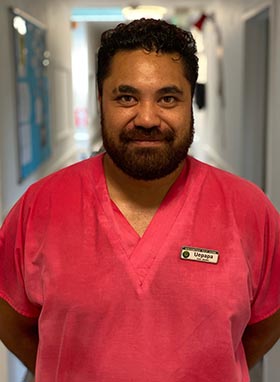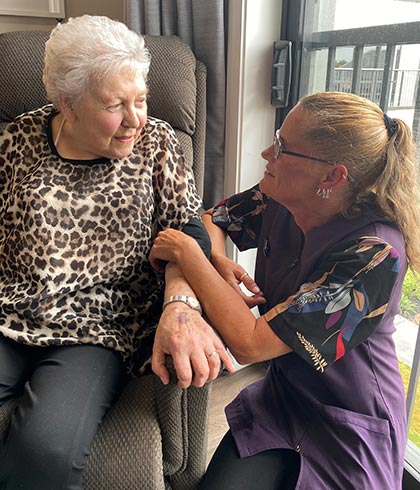In our fast-paced world, it is easy to focus on the complexities and hardship we face daily. As a result, we often underestimate our individual power to turn one person’s life around.
Caregivers are special people who have chosen to respond to the call to make a difference to the people who once cared for us. They perform many roles, from assisting with physical activities like showering and toileting, to providing residents and their whānau emotional support.
Caregivers are our unsung modern heroes. A good caregiver can transform the darkest moments into joy with a caring connection.
During this pandemic, we have witnessed the dedication and compassion of caregivers. In a difficult and uncertain year, caregivers have been steadfast companions to our loved ones in times when we cannot be with them.
It takes someone special to be a caregiver – kindness, calmness and patience are needed in great quantities. For caregiving, like any job, does not come without challenges in our busy aged residential care sector.
The College of Gerontology Nursing would like to recognise and acknowledge our health-care assistants, as we celebrate National Caregiver’s Week (March 22-28).
It is not how much they do, but how much love they put in the doing.
– Mother Teresa of Calcutta
Caregivers must get to know the person
Morrinsville caregiver Uepapa Tauariki always takes time to find common ground with residents.

Former meat worker Uepapa Tauariki (Tainui) decided to give caregiving a try when his partner told him about an opening at Kingswood Rest Home in Morrinsville, where she worked. Working in the dementia unit for the past 18 months, Tauariki has discovered he really loves it.
On any given day, he will be doing everything from arts and crafts or colouring in, to throwing a rugby ball around outside with some of the residents.
They seem to enjoy having him around also. “Having a male caregiver I think made some of the men there feel more comfortable, especially for cares.”
Not only that, but Tauariki’s own father has dementia. While he lives in another rest home, Tauariki said working with residents experiencing dementia has helped him understand what his father is going through, and how better to support him.
Tauariki says he tries to always take the time to talk to residents and get to know the person they are beneath the dementia – and encourages colleagues to do the same. “I always tell them, ‘don’t judge them because they have dementia, just talk to them about their background’.”
While it can be busy, he is supported by the rest-home management to spend time with the residents.
I always tell them, ‘don’t judge them because they have dementia’, just talk to them about their background.
Tauariki – who comes from a shearing family in the Gisborne region – says he’ll happily spend an hour with residents, chatting with them, so they don’t feel lonely and anxious, often finding shared experiences.
“I do have some similarities with some of them here, the shearers and meatworkers – so I have the opportunity to bring back those memories. They can remember what it was like to be in the working world.”
And many have really interesting stories, for those who listen. “I like listening to them – our old people have so many stories.”
Sometimes, those stories are sad, involving loss and loneliness. Those times, Tauariki has to remind himself not to get too attached. He can also talk the experiences over with his partner, also a caregiver, who understands.
While he has an eye on police training one day, for now Tauariki, a father of five, says he’s very happy in his role. “I love working here.”
Caring for people through ‘ups and downs’
Dawn Jenkins discovered a love of caregiving and a new job after looking after her dying father.

It was her ailing father who suggested Dawn Jenkins consider taking care of older people. “I was very close to my dad. If it wasn’t for him putting it into my head, I don’t know what I would be doing,” says Jenkins, who works as a health-care assistant (HCA) at the Summerset on Cavendish retirement facility in Christchurch.
Jenkins had been a childcare provider, a role she had juggled with parenting for more than 30 years, as she raised her own six children – now aged 11 to 31. But caring for her dad before he passed away four years ago, sparked a change in her life.
“I was at the hospital with him all the time, doing what I could to help him. It was really him who said ‘you should go and work in a rest home, with the elderly’.”
Jenkins, a single parent, mentioned his comment to her case manager at Work and Income New Zealand not long after. Within a few weeks a housekeeping position had arisen at Summerset, and her case manager encouraged Jenkins to apply for it.
She got the job and then began helping out with other duties. Within a few months, she was offered an HCA role – and “loves it”. She has mostly learned on the job, but says there are also training opportunities.
Jenkins always tries to take the time to chat and listen to residents, as well as encouraging them to join social activities and takes them out for walks. She mainly works with the serviced apartment residents but also helps in the rest home.
“I always encourage people to go and do exercise and interact with others, not just sit in their apartment or room by themselves,” Jenkins said.
“I don’t rush anybody. If someone wants to talk, I will sit down and talk to them. If I’m busy, I say ‘I will come back later and we’ll have a cup of tea’.
“The way I look at it, is I treat everyone the way I would like to have my dad treated.”
There are ups and downs in the residents’ lives, and she tries to be there for them throughout. “Some days, you’re comforting them when they’re crying, or there are good days when they’re laughing.”
Jenkins says she, too, gets a lot out of the relationships. “You learn things every day and if you take the time to talk to your residents, you learn about their home life, growing up, where they’ve been – some have amazing stories. Some have really sad stories too.”
“You can take things from what they say, too, and learn and grow. You can even take on some of the values they had when they were little – they lived through some terrible times – and try and put it into your own children’s lives.”
Jenkins says management are very supportive and she often will “debrief” by talking through with her village manager if she has been supporting an upset resident.
‘I don’t rush anybody. If someone wants to talk, I will sit down and talk to them.’
Summerset care centre manager Roxane Will said caregivers were the “building blocks” of aged care.
“They really get to know the residents – their idiosyncrasies, their likes, their dislikes. The residents’ happiness often lies in the relationship that they have with their caregivers.”
Despite a long list of jobs, she said Jenkins always found time to connect with residents.
“With Dawn, they’re not just residents, they’re people,” Will said. “She doesn’t see it as a job, but she sees it as loving the people she’s caring for.”
The work is never boring, says Jenkins. “Every day you go in and you don’t know what you’re going to walk into.”
There have been times she’s found a resident on the floor after a fall. Then, she calls a nurse for help, makes sure they’re comfortable, staying calm and reassuring them until help comes.
It’s hard also when they die. “You get close bonds and get to know them, then they pass on. That’s hard,” she says. “You don’t just get the bond with who you’ve looked after, you get the bond with the family too – you feel for them when their mum or dad has passed.”

